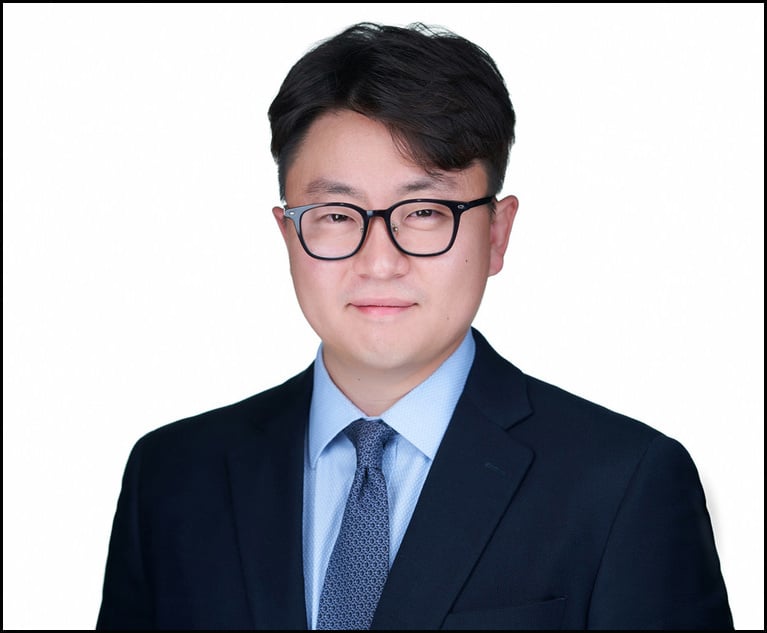Indictment Charges NJ Tech Execs With Discussing Bribery Scheme During Video Conference Calls
The former chief legal officer and president of a New Jersey-based tech services company allegedly discussed a scheme to bribe government officials during video conference calls, according to an indictment filed in New Jersey federal court.
February 21, 2019 at 11:30 AM
3 minute read
The original version of this story was published on Corporate Counsel
 Credit: Atstock Productions/Shutterstock.com
Credit: Atstock Productions/Shutterstock.com
The former chief legal officer and president of a New Jersey-based tech services company allegedly discussed a scheme to bribe government officials during video conference calls, according to an indictment filed in New Jersey federal court.
Prosecutors allege that ex-CLO Steven Schwartz and former president Gordon Coburn of Cognizant Technology Solutions Corp. in Teaneck authorized a construction company to pay more than $3.6 million in bribes to secure a planning permit for a large campus in Chennai, India.
The payments allegedly fast-tracked the building project, allowing Cognizant to avoid costly delays and related expenses, which would have included paying to support thousands of India-based employees in different facilities, according to prosecutors.
The U.S. Securities and Exchange Commission announced Feb. 15 that New Jersey-based Cognizant had agreed to pay $25 million to settle allegations that it violated the Foreign Corrupt Practices Act.
Now, Schwartz and Coburn are facing charges from the SEC and the Department of Justice, which alleges in the aforementioned 12-count indictment in U.S. District Court in New Jersey that the duo violated the FCPA, conspired to violate the FCPA, falsified books and records and circumvented or failed to implement internal accounting controls.
Roberto Finzi, a partner at Paul, Weiss, Rifkind, Wharton & Garrison in New York, and Joel Myers, a partner at Bohrer PLLC in New York and a former state and federal prosecutor, are defending Schwartz.
Finzi has said that Schwartz “is totally innocent and did nothing wrong. He will fight these false and unfair charges.”
Coburn's attorney, Hank Walther, a former federal prosecutor and partner at Jones Day in Washington, D.C., said Wednesday in an emailed statement: “We are disappointed that DOJ and SEC chose to pursue these allegations. Mr. Coburn intends to vigorously fight all charges.”
The DOJ indictment alleges that Coburn and Schwartz participated in two video conference calls with a pair of unnamed co-conspirators in April 2014, when Coburn and Schwartz were told that the construction company in question had received a bribe demand from government officials in India.
Coburn, Schwartz and the co-conspirators allegedly “agreed during these calls that the construction company would pay the bribe, and that Cognizant would reimburse the construction company for the bribe payment.”
Based on their communications with the co-conspirators, which also included email exchanges, prosecutors allege that Coburn and Schwartz also knew that reimbursement for the bribe would be included in the amount that Cognizant agreed to pay the construction company. And they allegedly knew that a claims list for the construction company's expenses had been falsified in an attempt to conceal the illicit payment.
According to the DOJ and SEC, Schwartz and Coburn kept Cognizant's chief financial officer, CEO and auditor in the dark about the alleged bribery payments.
Schwartz allegedly gave Coburn approval to sign management representation letters between August 2014 and June 2016 in which Coburn falsely certified that he had no knowledge of fraud or any other violations at the company.
This content has been archived. It is available through our partners, LexisNexis® and Bloomberg Law.
To view this content, please continue to their sites.
Not a Lexis Subscriber?
Subscribe Now
Not a Bloomberg Law Subscriber?
Subscribe Now
NOT FOR REPRINT
© 2025 ALM Global, LLC, All Rights Reserved. Request academic re-use from www.copyright.com. All other uses, submit a request to [email protected]. For more information visit Asset & Logo Licensing.
You Might Like
View All


On the Move and After Hours: Buchanan; Malamut Law; Genova Burns; Faegre Drinker
3 minute readTrending Stories
Who Got The Work
J. Brugh Lower of Gibbons has entered an appearance for industrial equipment supplier Devco Corporation in a pending trademark infringement lawsuit. The suit, accusing the defendant of selling knock-off Graco products, was filed Dec. 18 in New Jersey District Court by Rivkin Radler on behalf of Graco Inc. and Graco Minnesota. The case, assigned to U.S. District Judge Zahid N. Quraishi, is 3:24-cv-11294, Graco Inc. et al v. Devco Corporation.
Who Got The Work
Rebecca Maller-Stein and Kent A. Yalowitz of Arnold & Porter Kaye Scholer have entered their appearances for Hanaco Venture Capital and its executives, Lior Prosor and David Frankel, in a pending securities lawsuit. The action, filed on Dec. 24 in New York Southern District Court by Zell, Aron & Co. on behalf of Goldeneye Advisors, accuses the defendants of negligently and fraudulently managing the plaintiff's $1 million investment. The case, assigned to U.S. District Judge Vernon S. Broderick, is 1:24-cv-09918, Goldeneye Advisors, LLC v. Hanaco Venture Capital, Ltd. et al.
Who Got The Work
Attorneys from A&O Shearman has stepped in as defense counsel for Toronto-Dominion Bank and other defendants in a pending securities class action. The suit, filed Dec. 11 in New York Southern District Court by Bleichmar Fonti & Auld, accuses the defendants of concealing the bank's 'pervasive' deficiencies in regards to its compliance with the Bank Secrecy Act and the quality of its anti-money laundering controls. The case, assigned to U.S. District Judge Arun Subramanian, is 1:24-cv-09445, Gonzalez v. The Toronto-Dominion Bank et al.
Who Got The Work
Crown Castle International, a Pennsylvania company providing shared communications infrastructure, has turned to Luke D. Wolf of Gordon Rees Scully Mansukhani to fend off a pending breach-of-contract lawsuit. The court action, filed Nov. 25 in Michigan Eastern District Court by Hooper Hathaway PC on behalf of The Town Residences LLC, accuses Crown Castle of failing to transfer approximately $30,000 in utility payments from T-Mobile in breach of a roof-top lease and assignment agreement. The case, assigned to U.S. District Judge Susan K. Declercq, is 2:24-cv-13131, The Town Residences LLC v. T-Mobile US, Inc. et al.
Who Got The Work
Wilfred P. Coronato and Daniel M. Schwartz of McCarter & English have stepped in as defense counsel to Electrolux Home Products Inc. in a pending product liability lawsuit. The court action, filed Nov. 26 in New York Eastern District Court by Poulos Lopiccolo PC and Nagel Rice LLP on behalf of David Stern, alleges that the defendant's refrigerators’ drawers and shelving repeatedly break and fall apart within months after purchase. The case, assigned to U.S. District Judge Joan M. Azrack, is 2:24-cv-08204, Stern v. Electrolux Home Products, Inc.
Featured Firms
Law Offices of Gary Martin Hays & Associates, P.C.
(470) 294-1674
Law Offices of Mark E. Salomone
(857) 444-6468
Smith & Hassler
(713) 739-1250







